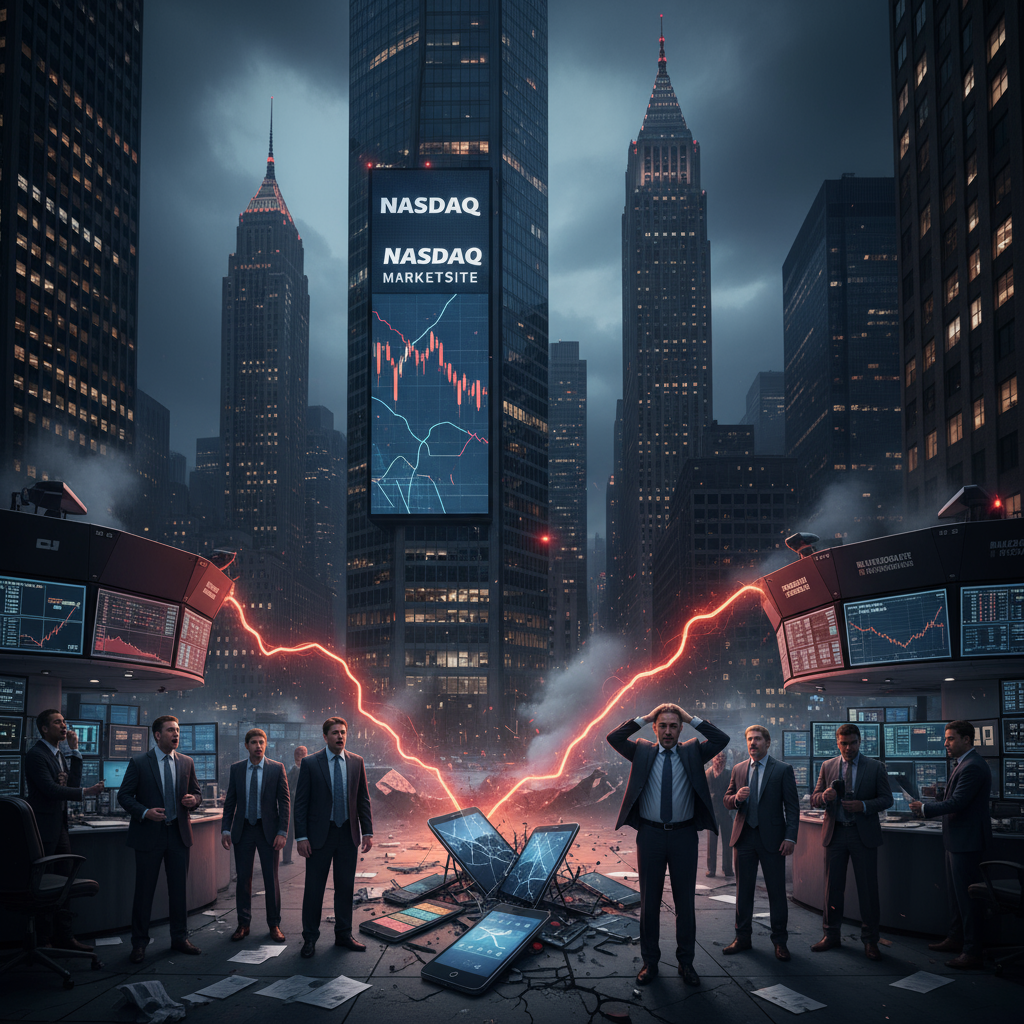When Tech Titans Tremble: Unpacking the $770 Billion Nasdaq Plunge

The year 2024 has certainly been a rollercoaster for the financial markets, but a recent event has sent shivers down the spines of investors and tech enthusiasts alike. In a dramatic turn, tech megacaps collectively shed a staggering $770 billion in value, as the Nasdaq Composite experienced its steepest decline since April. This isn’t just a blip on the radar; it’s a significant tremor in the foundations of the digital economy, prompting questions about market volatility, investor sentiment, and the future trajectory of our most influential tech giants.
For years, the likes of Apple, Microsoft, Amazon, Google (Alphabet), Meta, Tesla, and Nvidia – often dubbed the “Magnificent Seven” – have been the darlings of Wall Street, seemingly immune to broader economic headwinds. Their innovative power and market dominance propelled them to unprecedented valuations. However, this recent downturn serves as a stark reminder that even the mightiest can falter, and that the tech sector, for all its revolutionary potential, is not entirely impervious to gravity.
The Perfect Storm: What Triggered the Sell-Off?

Pinpointing a single cause for such a colossal market movement is rarely straightforward. Instead, a confluence of factors often creates a “perfect storm” that spooks investors and triggers a widespread sell-off. In this particular instance, several interconnected elements appear to have contributed to the Nasdaq’s dramatic slide and the subsequent decimation of tech megacap valuations.
One significant factor likely lies in the evolving macroeconomic landscape. Persistent concerns about inflation, coupled with the Federal Reserve’s hawkish stance on interest rates, have created an environment of uncertainty. Higher interest rates typically make future earnings less attractive, particularly for growth-oriented tech companies that rely on distant projections for their valuation. Investors, anticipating tighter monetary policy and a potential slowdown in economic activity, might be re-evaluating their positions in these high-valuation stocks.
Furthermore, recent earnings reports, or perhaps guidance revisions from some major tech players, could have played a role. While specific details would be needed from the source article, even slightly lower-than-expected revenue growth or revised profit forecasts from one or two key players can send ripples across the entire sector. When market sentiment is already fragile, any hint of weakness can be amplified, leading to broader selling pressure.
The Magnificent Seven Take a Hit: Examples and Implications
The $770 billion figure isn’t just an abstract number; it represents a significant chunk of wealth wiped out from the market capitalization of some of the world’s most recognizable companies. While the specific breakdown wasn’t provided in the prompt, it’s safe to assume that each of the “Magnificent Seven” – Apple, Microsoft, Amazon, Alphabet, Meta, Tesla, and Nvidia – experienced substantial declines.
Consider Apple, a company often lauded for its robust ecosystem and loyal customer base. Even a modest percentage drop in its stock price can translate into tens of billions of dollars in lost market value due to its sheer scale. Similarly, an AI powerhouse like Nvidia, which has seen stratospheric growth, might be particularly vulnerable to market corrections if investors perceive its valuation as stretched, or if there are concerns about the pace of future AI adoption or competition.
The implications extend far beyond individual stock prices. Such a significant drop can impact pension funds, mutual funds, and individual investors who have heavily invested in these tech giants. It can also signal a shift in investor appetite, potentially encouraging a move towards more stable, value-oriented sectors, at least in the short term. The tech sector’s influence on the broader economy is undeniable, and a substantial pullback like this can have knock-on effects across various industries.
Navigating Volatility: Investor Sentiment and Future Outlook
Market volatility is an inherent part of investing, but dramatic drops like this naturally elicit strong emotions. For some investors, it’s a moment of panic and regret. For others, it presents a potential buying opportunity, assuming they believe in the long-term fundamentals of these companies. The key often lies in understanding the underlying reasons for the sell-off and distinguishing between temporary headwinds and fundamental shifts.
Looking ahead, the long-term outlook for these tech megacaps remains a subject of intense debate. While the recent downturn is significant, these companies still possess immense resources, unparalleled innovation capabilities, and dominant market positions. The push into artificial intelligence, cloud computing, and other emerging technologies continues unabated.
However, challenges persist. Regulatory scrutiny is increasing globally, and concerns about monopolies and data privacy are growing. The competitive landscape is also constantly evolving, with new startups and established players vying for market share. Investors will be closely watching for signs of sustained profitability, continued innovation, and effective navigation of these regulatory and competitive pressures.
Conclusion: A Wake-Up Call or a Healthy Correction?
The $770 billion loss experienced by tech megacaps and the Nasdaq’s steepest drop since April serve as a powerful reminder that even the most celebrated companies are subject to market forces. Whether this event is merely a healthy correction after a period of rapid growth, or a more significant warning sign of shifting market dynamics, remains to be seen.
One thing is clear: investors are becoming more discerning, and the era of seemingly limitless growth for tech giants without strong underlying fundamentals might be waning. The next few quarters will be crucial in determining whether these tech titans can regain their previous momentum, adapt to a more challenging economic climate, and continue to innovate their way back to higher valuations. For now, the market has sent a clear message: even the tech megacaps are not invincible, and prudence remains paramount in the world of investing.

